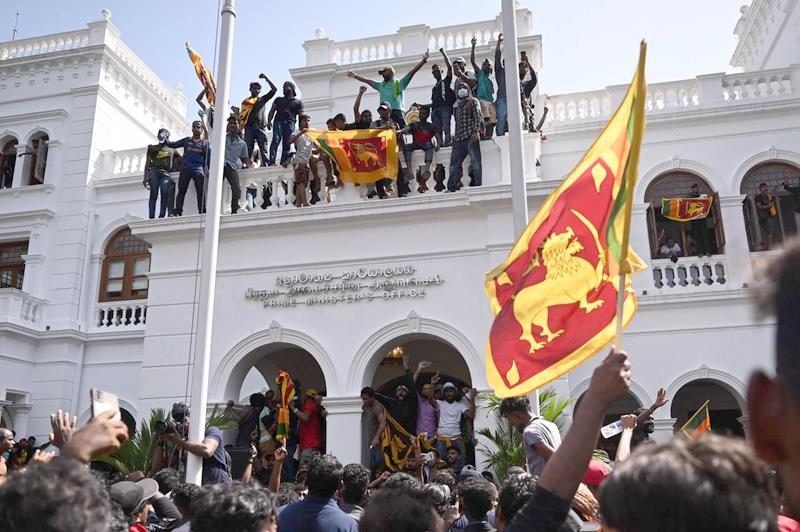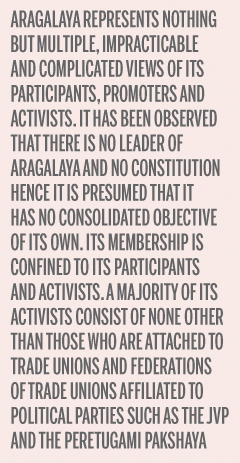
The legal recognition of the fundamental rights: viz freedom of peaceful assembly, freedom of Association, Freedom to form and join a trade union derives from article 14(1)(b), c and d in chapter 3 of the Constitution of Sri Lanka, International Labour Organization (ILO) conventions 87 and 98 ratified by the Government, Trade Union Ordinance and Industrial Disputes Act and subsequent amendments thereto.
Article 14(1) b, c and d of the Constitution states under the caption Fundamental Rights, every citizen is entitled to, freedom of peaceful assembly, freedom of association, and freedom to form and join a trade union.
ILO conventions 87 and 98 state freedom of association and protection of the right to organise and collective bargaining as Human Rights. Article 2 of the part 1 of the Trade Union Ordinance has interpreted the terms “trade union” and “strike”. Article 48 of the Industrial Disputes Act follows the same interpretation given to “Trade Union” and “strike” in the Trade Union Ordinance.
The code of Fundamental Rights and Human Rights set out in the above legal sources is not absolute or without limitations. In fact, those rights should be exercised subject to certain limitations. Article 14(1)b of Chapter 3 of the Constitution qualifies freedom of assembly must be peaceful. Article 15(7) of the same chapter of the Constitution specifies that “the exercise and operation of the all Fundamental Rights declared and recognised by Article 14 shall be subject to such restrictions as may be prescribed by law in the interest of national security, public order and the protection of public health or morality or for the purpose of securing due recognition and respect for the rights and freedom of others or of meeting the just requirements of general welfare of the democratic society. For the purposes of limitations set out in the paragraph “Law” includes regulations made under law for the time being relating to the public security.”
Interest of national security, public order, due recognition and respect for the right and freedom of others should not be jeopardised or paralysed in the process of exercising fundamental rights above referred to.
Limitations
 The protest launched by Aragalaya and its activists, political parties and trade unions affiliated to those parties should be evaluated from the perspective of the context of limitations set out in Article 14(1)“b” (peaceful) and all other limitations set out in Article 15(7) of the Constitution above referred to.
The protest launched by Aragalaya and its activists, political parties and trade unions affiliated to those parties should be evaluated from the perspective of the context of limitations set out in Article 14(1)“b” (peaceful) and all other limitations set out in Article 15(7) of the Constitution above referred to.
Those who support “Aragalaya” have pointed out that Aragalaya is a peaceful move and a gathering of peace loving youth of the nation for the purpose of changing the system and saving the country from corrupt politicians. They said that Aragalaya reflects the ground reality of the country.
Could they substantiate their comments above referred to? It is a fact that Aragalaya represents nothing but multiple, impracticable and complicated views of its participants, promoters and activists. It has been observed that there is no leader of Aragalaya and no Constitution hence it is presumed that it has no consolidated objective of its own. Its membership is confined to its participants and activists. A majority of its activists consist of none other than those who are attached to trade unions and federations of trade unions affiliated to political parties such as the JVP and the Peretugami Pakshaya. It does not mean that Aragalaya represents the majority of masses of the country.
Although the entirety of supporters and activists of Aragalaya could be considered as some fraction of the masses of the country, it is not factually correct to conclude that they represent the majority of the masses of the country as a whole. In a Parliamentary Democracy, the degree of mass representation could be measured only through a Parliamentary election and the number of members (representatives) secured by each political party in Parliament, who contested.
Arising therefrom it is a misnomer to highlight that Aragalaya represents the ground reality or what the majority of the masses of the country expected to do by the Government, due to the fact that there is no representation from Aragalaya in Parliament.
The fact that activists of Aragalaya are engaged in a peaceful protest seems to be debatable. Setting fire to a large number of private and public properties, entering by force to the President’s House and the Secretariat of the President and Temple Tree and looting and vandalising of those properties occupying Galle Face Green arbitrarily for their activities depriving the public to use it freely, causing insults invectives, arrogance against the Government cannot be considered in any case as peaceful protest.
Ground reality
The politicians who use Aragalaya as a cat’s paw to realise their own political agendas in Parliament argue that the ruling party in Parliament does not reflect the ground reality of the country. They are of the view that only Aragalaya reflects the ground reality or public opinion in respect of the Government. What do they mean by the ground reality? If they truly believe that, conduct, behaviour and agitation of activists of Aragalaya that “Gota Go Home”, “Ranil Go Home”, “entire 225 parliamentarians Go Home” and an anarchical situation that could emerge therefrom as the ground reality, it is in fact a misnomer and a baseless evaluation of the reality, due to the fact that the ground reality means what exactly people wanted to do by the Government not that Aragalaya wanted to do.
What do people want to do by the Government? It is in fact nothing but to resolve ongoing political and economic crises, restore public security, law and order which have deteriorated, eradicate fuel, gas, food, medicine and all sorts of queues, bring down cost of living, restore normalcy of adequate supply of fertiliser, mitigate adverse impact of inflation over the masses and in the long run, set a mechanism for the development of an export oriented economy, agriculture and thereby establish sustainable and inclusive growth.
There is a significant difference between what Aragalaya wanted to do and what people of the country wanted to do by the Government. Pro-critics of Aragalaya have pointed out that one of the objectives of Aragalaya is to change the system. What is the system change they wanted? Do they have a plan or a road map for a system change? Have they identified the system wanted to be changed? Clarification is needed whether sending home the entire Legislature (225 MPs in Parliament) and Executive (Executive President and Cabinet of Ministers) is the system change that they wanted or whether it would be a change of the system to a no-system or anarchy.
Is that the system change what dissident groups of Parliamentarians in the ruling party and in the opposition who support and promote Aragalaya within Parliament wanted? In that context, their agitation for a system change itself has proved that it is a hoax. If the system that they wanted to change is the system based on Parliamentary Democracy, what is the system to replace Parliamentary Democracy?
Amendments to the Constitution or replacement of the Constitution with a new Constitution are considered Constitutional change, the process for which has to be activated through Parliament. Both the ex-President and the incumbent President have given their utmost priority and support for this requirement. Could Constitutional change be done by sending home the entire Legislature and the Executive as agitated by activists of Aragalaya?
Hazardous agitations, protest rallies, hartals and strikes activated by trade unions affiliated to various disgruntled political parties that use Aragalaya as a cat’s paw to realise their hidden agendas to grab Governmental power, play a prominent role in Aragalaya. They are considered part and parcel of Aragalaya.
Damage and disruption
There is no need to elaborate massive damage and disruption of those trade union actions caused to the economy, social order, stability, trade and industries of the country. The actions above referred to are considered Fundamental Rights of the Trade Unions. However, the reasonableness of those actions should be evaluated from the perspective of the ulterior motive behind those actions.
“Although fundamental the right to strike may be, it is misleading to assume that it is a fundamental Human Right or that it is unlimited”. (The Legal Framework of Industrial Relations in Ceylon by S.R. de Silva). There is a vast difference between the impact of a normal strike and the impact of a political or general strike over the community at large. Political strikes generally seek to bring pressure on the Government in respect of a political objective. Due to the essential nature of the services rendered by the Government sector as well as private sector organisations, economic loss, inconvenience and hardships resulting from a general strike or political strike are born by general public not the so-called trade union leaders.
The prime objective of a political strike is nothing but to cripple or topple the Government in power elected by the people democratically. In that context, political strikes are considered as unlawful threat to Parliamentary Democracy, law and order, public security and sovereignty of the people at large. Remember the leaders of those trade unions who activate political strikes are considered not only as part and parcel of Aragalaya, but also affiliated to political parties that represent their interest as well as the interest of Aragalaya in Parliament.
Enforcement of Emergency Regulation is necessary in the present circumstances of the country to protect Parliamentary Democracy, law and order, public security which have been jeopardised by unruly and irresponsible conduct and behaviour of trade unionists turned prominent activists of Aragalaya. Remember the threat induced openly by leaders of the trade union arms of the JVP to besiege Parliament (Legislature) and expel 225 Members of Parliament and the Executive (President plus Cabinet of Ministers) as next step to be implemented by Aragalaya.
Aspirations
There is a close resemblance between activists of Aragalaya and those who are reluctant to support a unity and all-party Government within Parliament. This situation has been reflected in the event of casting of vote in Parliament to elect the Executive President and to pass the Emergency Regulations enforced by the Government. Those who voted in favour of Ranil Wickremesinghe at the election held in Parliament and also in favour of passing emergency regulation imposed by the Government are to be considered as Members of Parliament who represent aspirations and needs of the masses. Those who did not vote in favour of above events, represent Aragalaya and its aspirations.
As pointed out above, the immediate needs of the people are nothing but to resolve ongoing political and economic crises. Unity within Parliament is absolutely necessary for the purpose. Whereas Aragalaya wanted to send home the Legislature and the Executive and to grab Governmental power, without any practicable strategy to do so and a replacement for the system in their hand, President Wickremesinghe has shown considerable progress on his effort and assurance given to the nation to resolve political and economic crises.
The need of the hour in that context is that Parliamentarians should support and encourage the Government without any reservation and setting aside partisan politics and self-centered agendas to build unity and integrity within Parliament and strengthening the Government to resolve political and economic crises based on the unity and strength so gained.
